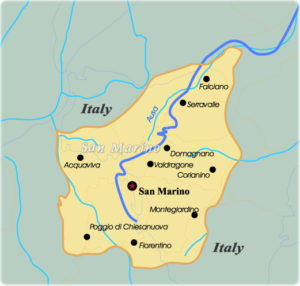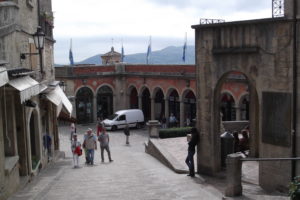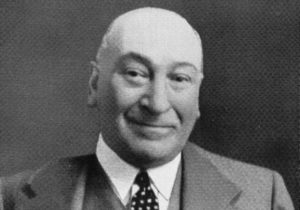 The history of the Jews in San Marino reaches back to the Middle Ages. San Marino is a small land locked country in central Italy. There has been a Jewish presence in San Marino for at least 600 years.
The history of the Jews in San Marino reaches back to the Middle Ages. San Marino is a small land locked country in central Italy. There has been a Jewish presence in San Marino for at least 600 years.
The first mention of Jews in San Marino dates to the late 14th century, in official documents recording the business transactions of Jews. There are many documents throughout the 15th to 17th centuries describing Jewish dealings and verifying the presence of a Jewish community in San Marino. Jews were required to wear special badges and live by specific restrictions, but were also afforded official protection from the government.

During World War II, San Marino provided a harbor for more than 100,000 Italians and Jews from Nazi and Italian persecution. Today, there are only small numbers of Jews in San Marino. No sites of Jewish built heritage have survived in San Marino, but in 2008 a commemorative plaque honoring Holocaust victims was unveiled on Vicolo dei Forni, the narrow street believed to have been the site of the medieval Jewish ghetto.
 Angelo Donati, a Jewish businessman and diplomat from the tiny Republic of San Marino who saved several thousand Jews in the Italian occupation zone in France and became known as the “Pope of the Jews,” died in 1960. Donati was general consul of San Marino from 19235 to 1932, then president of the Italian Chamber of Commerce in Paris until 1939, when the fascist racial laws forced him out, then headed the Franco-Italian Bank in Nice, where he also ran the Committee Dubouchage, the committee to aid refugees.
Angelo Donati, a Jewish businessman and diplomat from the tiny Republic of San Marino who saved several thousand Jews in the Italian occupation zone in France and became known as the “Pope of the Jews,” died in 1960. Donati was general consul of San Marino from 19235 to 1932, then president of the Italian Chamber of Commerce in Paris until 1939, when the fascist racial laws forced him out, then headed the Franco-Italian Bank in Nice, where he also ran the Committee Dubouchage, the committee to aid refugees.
Thanks to the information that he provided, the general consul of Italy Alberto Calisse was able to oppose Vichy pressures to deport Jews to Poland and to provide Jews in the Italian occupation zone with documents that the Vichy police were obliged to respect. Donati also developed a plan to rescue all 30,000 Jews in Nice and its environs by bringing them to Italy if the Nazis were to take over the Italian occupied zone.
The plan was derailed by Mussolini’s death in 1943. Nevertheless, according to an article by Erica Terry, “thanks to the help of Donati and the Italian authorities, thousands of Jews were saved by being permitted to cross into Italy from France. When it became too dangerous for him to remain in Nice, Donati escaped in 1943 to Switzerland.” He personally adopted two Jewish children, ages 8 and 10, whose German Jewish parents had been deported from France and murdered in concentration camps.